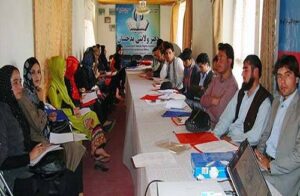.jpg)
GHAZNI (SW): Journalism is essentially a challenging profession. However, working with the media organizations in a country such as Afghanistan, brings even more challenges with it.
One of the biggest obstacles encountered by journalists in Ghazni province is the non-recognition of their due rights. A number of young people working with the local media in Ghazni have shared with Salam Watandar worrying tales. Sexual harassment, forced labor, non-contractual work and vague description of responsibilities are all part of the work of journalists and staff of many media houses in this province.
Bashirullah Naqshbandi had been working for a local radio station for over four years without signing any job contract. Nagshbandi said that he had been working six days a week from 6 am to 5 pm in multiple roles, and most of the nights he stayed in the office to finish the remaining work. Naqshbandi claimed that while he has been doing the work of three people, however, he has been paid only four thousand afghanis per month. On top of this, he has been paid each 9 months only.
Although, it has been some years now that Naqshbandi got out of this radio station, and found another position somewhere else, still he has not been able to receive his remaining compensation from the radio station. The officials at the radio station even abstained from providing him with the recommendation letter to retaliate against him in this way.
Some journalists, who did not want to be named, said that media owners have made them to cook for them in turn, and some also said that they’ve washed the cars of the owners and directors of the office many times.
Shakila Murid, who have been working in the local media in Ghazni, believed that the rights of all the women and girls are also violated. According to Shakila, media owners even interfere in their personal affairs such as their clothing and social relationships. Rahim Aria, a private media correspondent, said that he had worked in a local media for many years without any contract, and will never forget the troubles of that time in his life.
According to Aria, demanding different kinds of work from a journalist not related to thier field of work has become a norm here. Aria spoke of a bitter experience working as a journalist, and said he had been forced to resign after four years when the media owner did not fulfill the promise to raise his salary.
Mohammad Sabir Fahim from the organization of NAI – Supporting Open Media in Afghanistan, in relation to forced labor of journalists said that NAI addressed the range of misuses of reporters and journalists in the report they published a while ago. According to Fahim, any misuse of journalists is against the laws of the country and the principles of journalism.
Under the Anti-Trafficking Law, the hiring of people by using deception and taking advantage of their personal problems to exploit them is considered a kind of human trafficking. In this case, recruiting journalists with deceptive promises and fictitious salary and privileges, and using the journalists in works unrelated to their field of work, is an example of human trafficking.
Most of the private media workers are not willing to share their stories because of fear of being fired. However, when we listen to their personal stories, one could realize how disastrous their experiences have been.
ENDS





